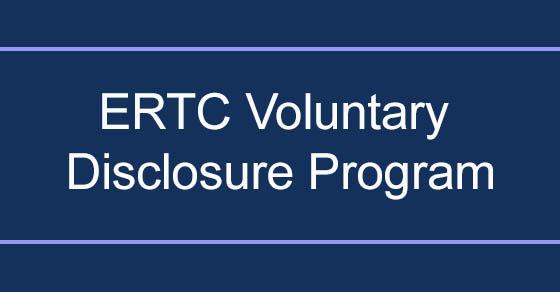The IRS unveils ERTC relief program for employers

Since July 2023, the IRS has taken a series of actions in response to what it has termed a “flood of ineligible claims” for the Employee Retention Tax Credit (ERTC). Most recently, it launched a Voluntary Disclosure Program (VDP). The program presents a valuable, but temporary, opportunity for eligible employers.
Flood of invalid ERTC claims
The ERTC is a refundable tax credit intended for businesses that 1) continued paying employees while they were shut down due to the pandemic in 2020 and 2021, or 2) suffered significant declines in gross receipts from March 13, 2020, to December 31, 2021.
With the credits worth up to $26,000 per retained employee, fraudulent promoters and marketers quickly pounced, offering to help employers file claims in exchange for large upfront fees or percentages of the money received. But the requirements for the credit are stringent, and many employers were misled into filing claims that have proven to be invalid, leaving those claimants at risk of liability for credit repayment, penalties and interest, as well as other tax problems.
IRS’s response
In the face of the deluge of invalid claims, the IRS intensified audits and criminal investigations of both promoters and businesses filing suspect claims. As of December 2023, it had more than 300 criminal cases underway with claims worth nearly $3 billion, and thousands of ERTC claims had been referred for audit.
The IRS also has instituted a moratorium on the processing of new ERTC claims. And, in October 2023, the agency began offering a withdrawal option for eligible employers that filed a claim but haven’t yet received, cashed or deposited a refund. Withdrawn claims will be treated as if they were never filed, so taxpayers need not fear repayment, penalties or interest.
In late December 2023, the IRS announced another ERTC relief initiative, the VDP. The program is intended for employers that claimed and received credit money but weren’t entitled to it.
VDP nuts and bolts
Employers that participate in the VDP may benefit in several ways. For example, they’re required to repay only 80% of the credit received (if repayment in full isn’t possible, the IRS may authorize an installment plan). They also aren’t required to repay any interest received on an ERTC refund or amend their income tax returns to reduce wage expense.
These employers won’t be subject to penalties or underpayment interest if the 80% repayment is made before the signed closing agreement is returned to the IRS. The 20% reduction won’t be treated as taxable income, and the IRS won’t audit the ERTC on employment tax returns for the tax periods covered by the closing agreement.
An employer can apply for the VDP for each tax period in which:
- Its ERTC claim was 1) processed and paid as a refund that has been cashed or deposited, or 2) paid in the form of a credit applied to that or another tax period,
- It believes it wasn’t entitled to the ERTC,
- It isn’t under IRS audit for employment taxes,
- It isn’t under IRS criminal investigation, and
- The IRS hasn’t reversed, or notified the employer of its intent to reverse, the ERTC to zero (for example, with a letter or notice disallowing the credit).
Notably, the IRS is sending up to 20,000 letters with proposed tax adjustments for the 2020 tax year to recover ineligible claims, in addition to 20,000 denial letters it sent earlier. The agency continues to work on the 2021 tax year, with more mailings to come. When an employer is identified through this work as receiving excessive or erroneous ERTCs, the IRS will pursue normal tax assessment and collection procedures.
If a third-party payer filed an employment tax return that reported an employer’s ERTC-related wages and credits, the employer can participate in the VDP only through the third-party payer. It’ll be rejected if it applies with its own employer identification number.
Act now
Bear in mind that not every ERTC claim was invalid. If you’re at all uncertain about the validity of your claim, regardless of whether you’ve received payment, we can help you navigate this increasingly complex area of your tax liability. The VDP is open only until March 22, 2024, though, so don’t delay.
© 2024





